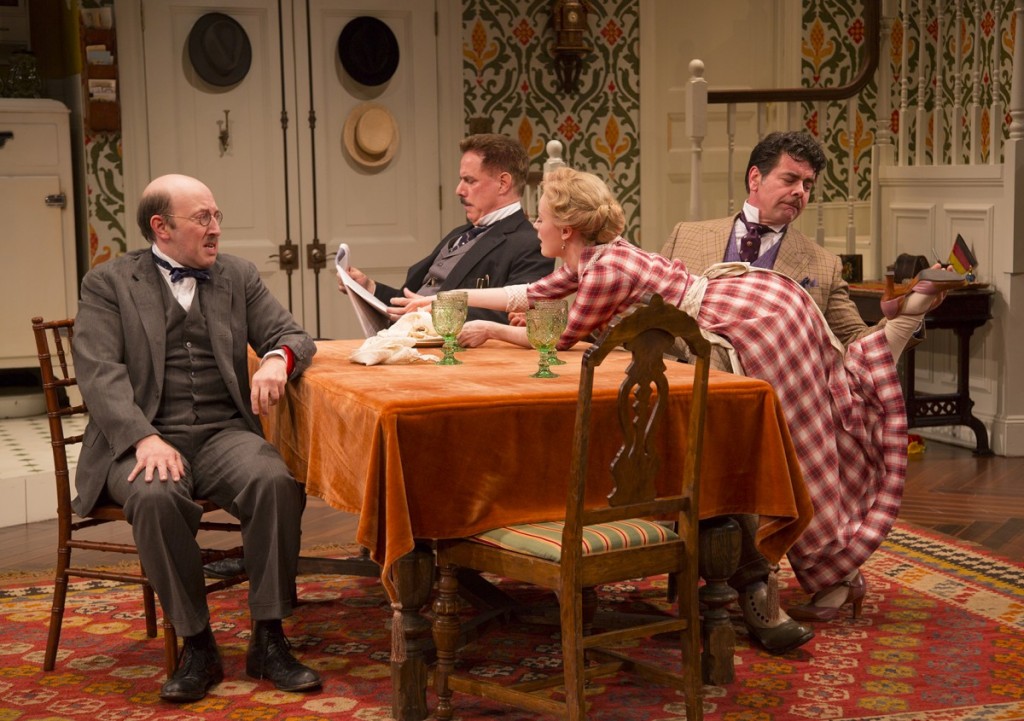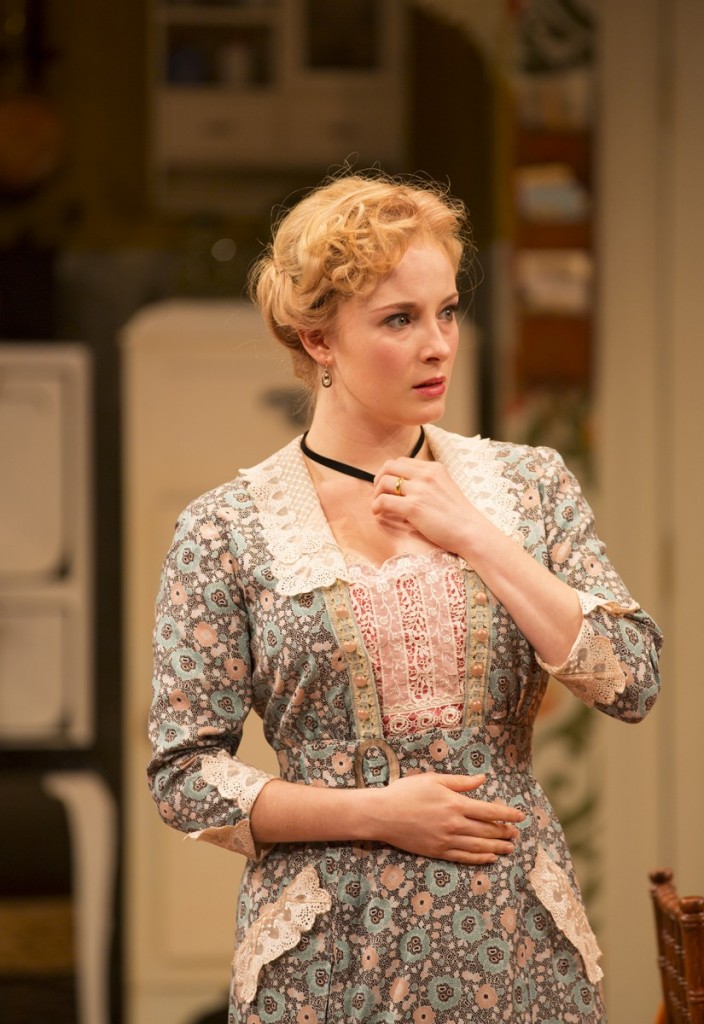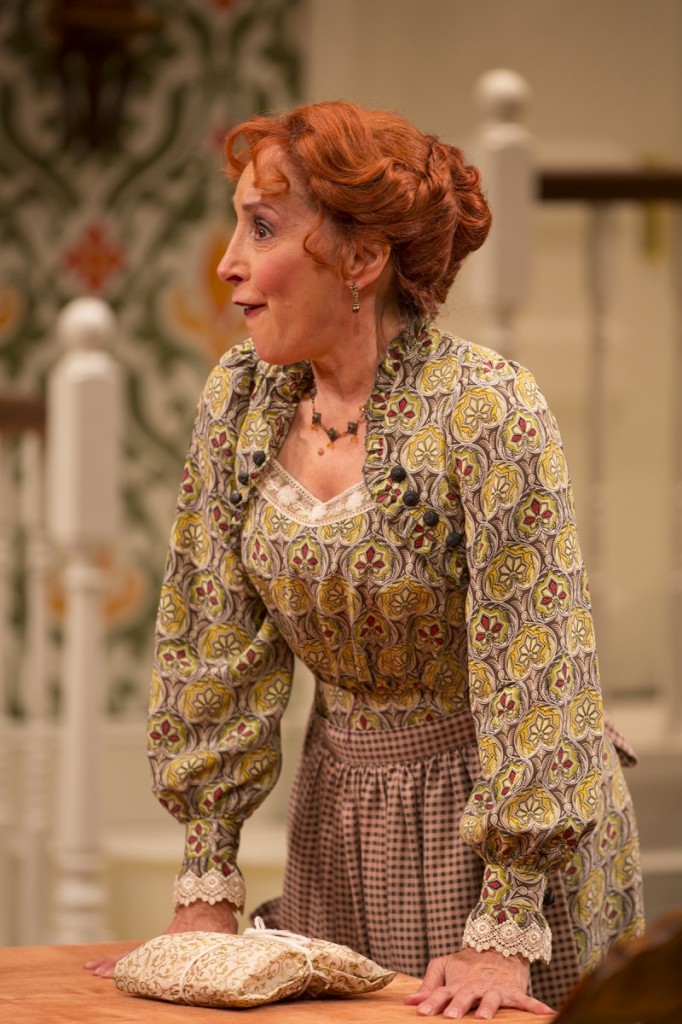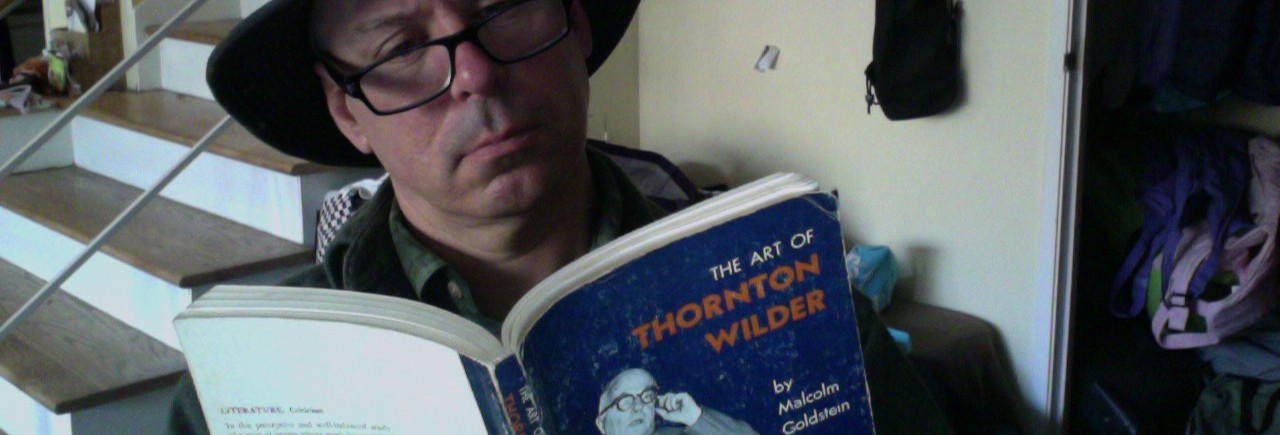
A review, by me, of the Long Wharf Theatre production of Steve Martin’s adaptation of Carl Sternheim’s play The Underpants, appeared in Friday’s Hartford Courant. That same review will reportedly also run in next week’s New Haven Advocate. You can find it online at www.ctnow.com, here.
Here are some further thoughts:
• To those who might despair that the opening show in the Long Wharf season is so unremittingly light and frothy, I’d say simmer down; you’ll have your Fences in a few weeks. Revel in the ridiculous. Gordon Edelstein hasn’t directed a flat-out comedy in ages. When he has done comedies, they’ve tended to skew dark: Sam Shepard’s Curse of the Starving Class last year, Willie Russell’s Shirley Valentine in 2011. When he did The Front Page in 2006 (with Jeff McCarthy, star of The Underpants, as Walter Burns), Edelstein chose the original version of the script, which added danger elements of racism, sexism and adultery to that oft-watered-down show.
Edelstein seems most comfortable when his shows can evoke a wide range of emotions. The Underpants doesn’t really allow for breadth, but Edelstein makes sure you can see the characters’ awkwardness as well as their sunniness.
In any case, this programming move is a big step up from last year’s misbegotten mainstage season-opener The Killing of Sister George, which had given the expectation of something edgy and wild but settled for coarse stereotypes and flat melodrama.
• I suspect Steve Martin kept the play in Sternheim’s original early 20th century German setting so he could play with the sexist attitudes and social stereotypes of the time without having to say (if you’ll pardon the expression) “Excuuuuuse me.” Some of the jokes—Martin’s, laid over Sternheim’s plot—are Jewish jokes, penis jokes, faux-intellectual jokes, cheap laughs quickly absorbed. There’s no reason why the play can’t be modernized—women’s panties fall down in public all the time nowadays, and folks tweet about it—but Martin’s throwback updates wouldn’t fly if it was. He gets to have his cake and eat it too; literate dialogue with “he’s so dumb” jokes.

• Jenny Leona, fresh out of Juilliard’s Drama Division and with a couple of Off Broadway credits to her name, is a genuine find for this show, the piece which helps it transcend bedroom farce and become something truer and deeper. For one thing, Leona has the alabaster skin and curvy figure of a classic idealized woman. You completely buy into the fact that everyone on stage is transfixed by her (and by the idea of her underwear slipping off). She’s the kind of pretty which doesn’t come off as dirty, and despite its many dick jokes The Underpants is desperately trying not to be dirty. (If it was striving for saucier, it would probably have been called The Panties, or The Underthings, or The Knickers.) Leona is charged with the seemingly impossible task of bringing loveability and credibility to a underwritten and inconsistently plotted role. Leona doesn’t stand back and let the ogling men define her. She’s forthright and pushy and adds a layer to the characterization by being unpredictable.
• The Underpants contains a fairly rare conceit: the joke that’s put there for folks who’ve bothered to read the program. An earlier example of such a phenomenon at the Long Wharf was with Charles Mee’s Big Love, an adaptation of an ancient Greek play. Mee names one of his characters Oed, pronounced “Ed” but spelled like Oedipus. When the character is asked his name and gives it, there’s nothing funny about the response—his name is Ed—unless you’ve read the program. In The Underpants, a character marches in the room having just been at the theater. A brandished program proclaims its title: Die Hose. Is it worth seeing? “Eh, wait for the adaptation.” By the time the punchline arrived, everybody gets what the joke is, but those who knew in advance that The Underpants is an adaptation is adapted from Carl Sternheim’s 1911 farce Die Hose laugh soonest and longest, as they’re part of a special smartie club.
• The play’s ending requires a whole new character to show up. Edelstein’s double-cast this role which an actor who’s been onstage a whole lot. Some of the situations discussed about this other character, and certain words he speaks in both his roles, may mislead the audience into thinking it’s still him, in disguise. Read the script and you’ll realize it’s not. Rather clunky, and makes us want to stop suspending belief at a critic moment. Sometimes you just shouldn’t have an actor take on too many parts.
• Didi Conn may once have famously played a Beauty School Drop-out, but she should be giving master classes in comic timing.

The Underpants, by Steve Martin, adapted from Carl Sternheim’s Die Hose, directed by Gordon Edelstein, plays through Nov. 10 at the Long Wharf Theatre, 222 Sargent Dr., New Haven. (203) 787-4282, www.longwharf.org. Set design: Lee Savage. Costume design: Jess Goldstein. Lighting Design: Robert Wierzel. Sound Design: David Budries. Wig & Hair Design: Charles LaPointe. Fight Consultant: Tim Acito. Production Stage Manager: Melissa M. Spengler. Assistant Stage Managers: Amy Patricia Stern and Kelly Hardy. Cast: Jeff McCarthy (Theo Maske), Jenny Leona (Louise Maske), Didi Conn (Gertrude Deuter), Burke Moses (Frank Versati), Steve Routman (Benjamin Cohen) and George Bartenieff (Klinglehoff).
